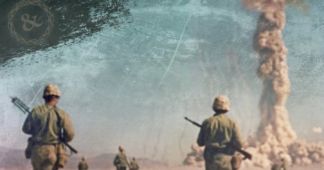This month marks the fiftieth anniversary of Stanley Kubrick’s black comedy about nuclear weapons, “Dr. Strangelove or: How I Learned to Stop Worrying and Love the Bomb.” Released on January 29, 1964, the film caused a good deal of controversy. Its plot suggested that a mentally deranged American general could order a nuclear attack on the Soviet Union, without consulting the President. One reviewer described the film as “dangerous … an evil thing about an evil thing.” Another compared it to Soviet propaganda. Although “Strangelove” was clearly a farce, with the comedian Peter Sellers playing three roles, it was criticized for being implausible.
An expert at the Institute for Strategic Studies called the events in the film “impossible on a dozen counts.” A former Deputy Secretary of Defense dismissed the idea that someone could authorize the use of a nuclear weapon without the President’s approval: “Nothing, in fact, could be further from the truth.” (See a compendium of clips from the film.) When “Fail-Safe”—a Hollywood thriller with a similar plot, directed by Sidney Lumet—opened, later that year, it was criticized in much the same way. “The incidents in ‘Fail-Safe’ are deliberate lies!” General Curtis LeMay, the Air Force chief of staff, said. “Nothing like that could happen.”
The first casualty of every war is the truth—and the Cold War was no exception to that dictum. Half a century after Kubrick’s mad general, Jack D. Ripper, launched a nuclear strike on the Soviets to defend the purity of “our precious bodily fluids” from Communist subversion, we now know that American officers did indeed have the ability to start a Third World War on their own. And despite the introduction of rigorous safeguards in the years since then, the risk of an accidental or unauthorized nuclear detonation hasn’t been completely eliminated.
Continue reading at www.newyorker.com
Dr Strangelove at 60: is this still the greatest big-screen satire?
By Scott Tobias
Jan 29, 2024
Sixty years ago, Columbia Pictures released the first of two black-and-white movies with the exact same premise: what if American planes with hydrogen bombs were inadvertently ordered to drop their payload on targets in the Soviet Union, potentially triggering an all-out nuclear war that wipes out humanity? The Cuban missile crisis had pushed the superpowers to the brink of conflict less than two years earlier, and film-makers were unusually eager to face their cold war nightmares head on.
The release dates were like a reversal of Karl Marx’s famous line about how history repeats itself, “first as a tragedy, second as a farce”. The farce, Stanley Kubrick’s Dr Strangelove, came first. Then the tragedy, Sidney Lumet’s Fail Safe, arrived in October. There was a lot of messy legal fallout over the common origins of the two films, but they complement each other beautifully, with only a slight difference in perspective on our inability to manage weapons of such god-like destruction.
The message of Fail Safe: human beings are fallible. The message of Dr Strangelove: human beings are idiots.
Continue reading at www.theguardian.com
We remind our readers that publication of articles on our site does not mean that we agree with what is written. Our policy is to publish anything which we consider of interest, so as to assist our readers in forming their opinions. Sometimes we even publish articles with which we totally disagree, since we believe it is important for our readers to be informed on as wide a spectrum of views as possible.











